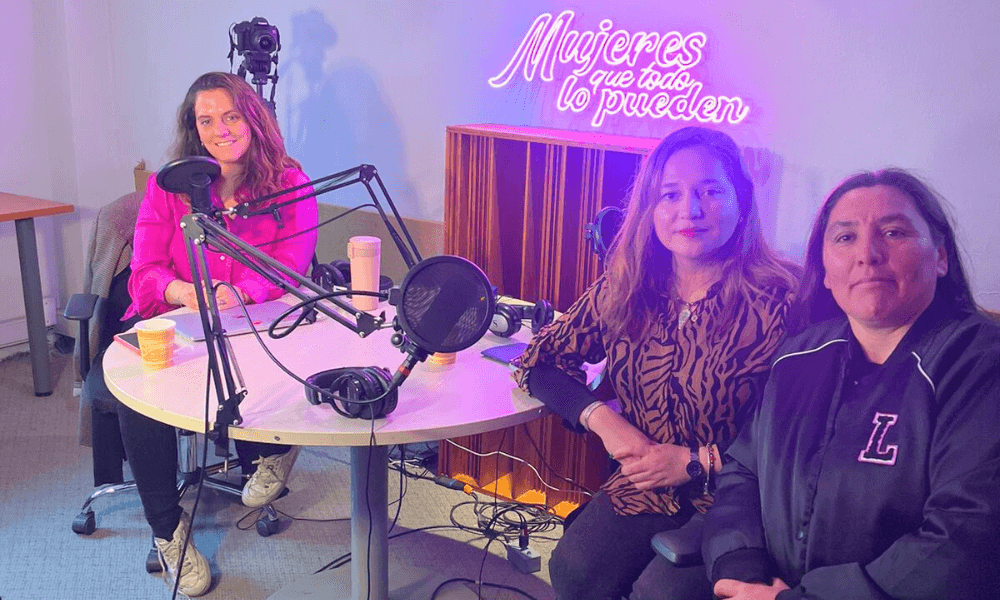Artificial intelligence, gender essentialism, stereotypes, and myths in traditionally male-dominated industries are among the topics discussed in the new podcast Mujeres que todo lo pueden. Backed by Fundación Luksic and developed in collaboration with Inacap, the podcast aims to highlight the talent of Chilean women in STEM, explore their perspectives, and inspire current generations to pursue these fields.
Despite significant progress, the gender gap remains substantial in Chile, even as more women pursue studies in science, technology, engineering, and mathematics (STEM). According to the Tercera Radiografía de Género (2023) by the Ministry of Science, Technology, Knowledge, and Innovation, many women drop out and do not graduate from these programs. The OECD average for women graduating in STEM fields is 16%, while in Chile, that figure drops to 8%.
The podcast features nine episodes, bringing together influential women in STEM and students in technical fields who received the Luksic Scholarship for More Women in STEM. Guests include engineer Barbarita Lara, astronomers Teresa Paneque and Francisca Contreras, Ana Salazar from Women in Mining, neuroscientist Florencia Álamos, Elisa Torres, founder of Girls in Quantum, STEAM leader Daniela Sáez, and other notable figures like Marcela Ruiz, Marcela Colombres, and Katharina Jenny.
Renowned Chilean inventor Barbarita Lara shares her experience as a STEM leader and how she forged her path in the second episode, “The Eureka Moment.” “I think it’s fantastic to have initiatives like this that showcase women’s work in STEM fields. It’s essential to democratize access to better opportunities because studying in these areas leads to higher salaries and broader career prospects. Talent has no age or gender, and we must build community. We are not alone; there are living role models, interviewed on this podcast, who are willing to support the development of women in these fields,” said the tech entrepreneur about the launch of Mujeres que todo lo pueden.
Neuroscientist and Executive Director of Fundación Kiri, Florencia Álamos, is featured in episode eight, “Women Inspiring Women”, alongside mechanical engineer Karla López. “Listening to this podcast is an opportunity to understand the issue of gender gaps in STEM and to draw inspiration from real stories of women who have broken glass ceilings. It’s important for both women and men to listen and share it: we need to make noise!” says Álamos.
“This platform allows us to discover incredible women who help highlight key issues and share experiences that often don’t get the recognition they deserve. Each episode inspires us with real stories, opens conversations about challenges in these areas, and showcases the tremendous contribution of these women to our country’s development,” commented Fernanda Orellana, Director of Education at Fundación Luksic.
The nine episodes were recorded at INACAP Ñuñoa and produced by students from the campus. Tania Sutin, head of INACAP’s STEM Network, emphasized the importance of initiatives that expand women’s participation in STEM careers: “Collaboration between organizations is key to advancing the challenge of increasing women’s participation in technical and professional STEM fields. By working together, we combine resources, experiences, and capacities, amplifying impact and reaching more people. Fundación Luksic’s project aims to empower women in STEM careers, and by supporting each other, we can accelerate the changes we need and build a support network that inspires more women to enter and succeed in these fields.”
Mujeres que todo lo pueden is now available on Spotify and is part of Fundación Luksic’s campaign in collaboration with over 20 organizations, educational institutions, and companies. The initiative seeks to encourage more women in Chile to study STEM fields, which offer vast career opportunities, better employability prospects, competitive salaries, and essential skills for life in the 21st century.

